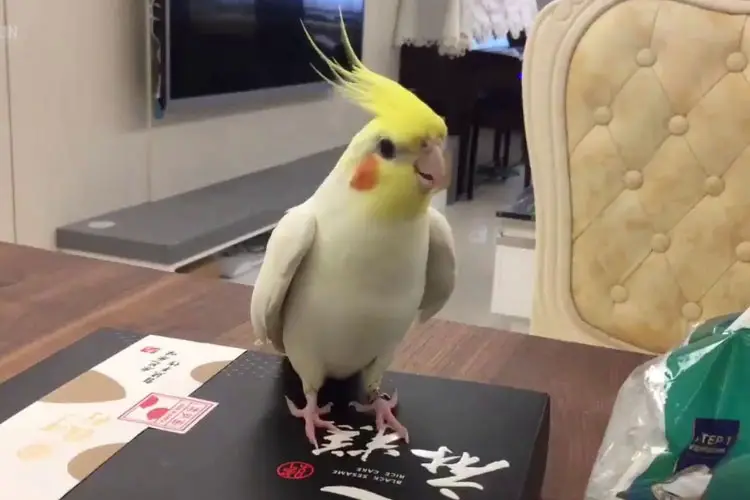As a cockatiel owner, you will observe numerous peculiar habits from your pet. Therefore, you must watch and interpret the behaviors. Some of the behaviors are a cockatiel’s way of communicating with you. One of the unusual habits of a cocktail is when it taps its beak. Let’s examine that.
The cockatiel will tap its beak if it needs food, water, or your attention. Beak tapping could also indicate boredom, fear, or anxiety. Furthermore, it is the cockatiel’s way of expressing affection, ownership over you, or, in some cases, jealousy. Cockatiels may also tap their beaks in response to noises in the cage or to communicate with one another.
This behavior is harmless but may cause concern due to fear, boredom, or anxiety. This article will explain why your cockatiel may engage in this strange behavior.
Why Does My Cockatiel Tap His Beak?
So, why do cockatiels tap their beaks? And should I be worried? Beak tapping is unusual in birds, so when your cockatiel does it, it tries to tell you something. You should only worry if the beak tapping becomes excessive or is caused by boredom or stress. The most plausible causes of beak tapping in cockatiels include the following:
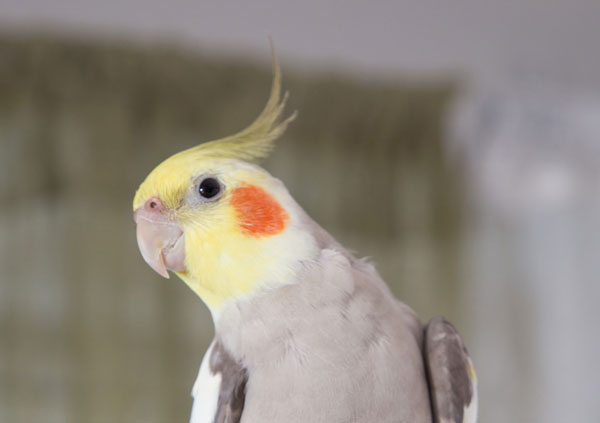
1. Passing a message
Beak tapping is one of the ways cockatiels communicate with one another and their owners. When your cockatiel taps its beak on things, it usually draws your attention. If you observe the cockatiel tapping its beak, try and determine what it desires.
Here are some explanations of why the cockatiel is tapping its beak on certain things;
- When the cockatiel wants to be let out, it taps on the cage door.
- When it’s hungry, it taps on its food bowl.
- If it wants to play with you, it taps on its toys.
- If a cockatiel needs food, water, or exercise, it will tap its beak against its cage to call your attention.
- If a cockatiel does not like something, it will tap its beak.
- If you respond to the sound, your cockatiel will learn that this action produces a response and, as a result, gets what it wants. When it realizes that, it will continue to tap its beak.
2. Boredom
Continuous, monotonous tapping may indicate boredom in your cockatiel. Therefore, the cockatiel will entertain itself by rhythmic tapping. Note that boredom may appear insignificant, but it seriously affects your cockatiel’s health.
Boredom could lead to detrimental behaviors such as:
- Self-mutilation, e.g., feather picking
- Stress and anxiety
- Aggression behavior, such as screaming and biting
Some signs of boredom in cockatiels include;
- Excessive pacing
- Biting
- Bald spots due to excessive preening
- Screeching
- Biting their cages
- Continuous head bobbing
3. Stress and aggression
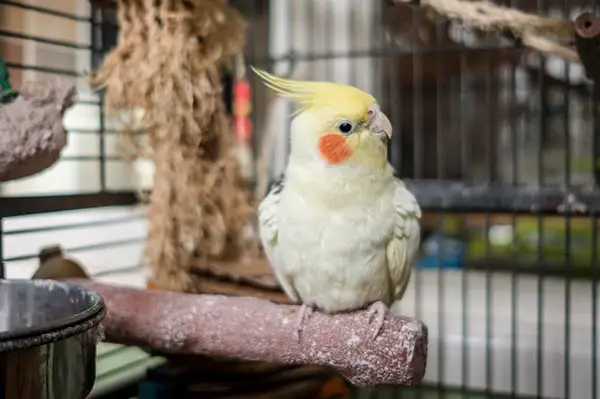
Beak tapping can also signify aggression, especially in stressed cockatiels. The following are the primary causes of cockatiel aggression:
- Changes in the cockatiel’s surroundings
- Predator pets, such as cats and dogs
- Loneliness
- Jealousy about another bird or person
- Changes in hormones
- When being territorial
- Boredom
Stress can lead to self-destructive behavior such as feather plucking, so you should take it seriously. Aggression and anxiety can be avoided by doing the following:
- Remove any stressors from your cockatiel’s environment, e.g., other pets or loud noises
- Provide the cockatiel with toys to solve boredom.
- Avoid yelling at your cockatiel. Keep your voice quiet and low, so it doesn’t perceive you as a threat.
- Don’t urge contact if your cockatiel is new or wants to be alone.
- If you have more than two same-sex cockatiels in one cage, separate them to prevent them from getting overly territorial.
- Approach your cockatiel from in front rather than from beyond or above it.
- Ensure the bird gets enough sleep.
- If you will introduce new changes to the cockatiel’s surroundings, do it gradually. That way, the cockatiel will acclimate to the changes and will not be stressed.
4. Lack of Grooming
A cockatiel’s beak continues to develop throughout its life. To keep its beak at a manageable length, your pet bird may tap it against the cage bars, perches, and toys. This type of beak tapping will be accompanied by beak rubbing or grinding.
The goal is to trim any overgrown keratin wear so that the beak remains at standard length. Also, after eating, the cockatiels will tap their beaks to eliminate any stuck food particles.
5. Socializing
In the wild, cockatiels communicate with one another through taps or clicks. So, if your cockatiel only taps its beak when it can see you, it is most likely trying to socialize. It could also be that the cockatiel is replying to another cockatiel’s taps or noises around the house. Cockatiels often make themselves louder to compete with other noises, such as the television.
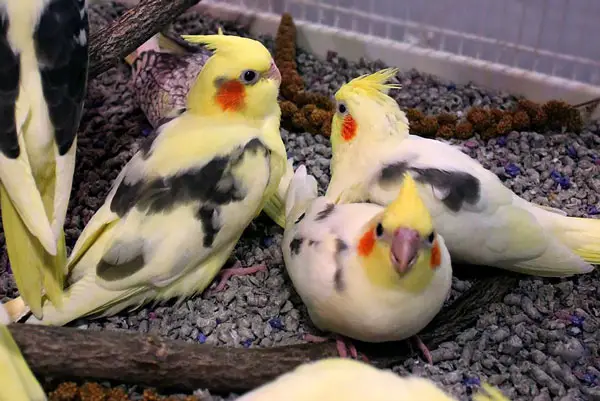
However, if your cockatiel appears distressed, it may be upset by the loud noises, and you should lower the noise or relocate it to a quieter location. Also, newly acquired cockatiels can engage in anxious tapping whenever you or others come close. If this occurs, relocate your cockatiel’s cage and give it space and time.
6. Territorial behavior
Cockatiels are pretty jealous birds. So, if you are showing more attention to another pet, the cockatiel will tap its beak on you to show possession over you. The cockatiel could also show claim on its toys, the cage, or favorite perch.
7. For fun
Some cockatiels may tap their beaks because they love to hear the sound it makes. Therefore they will continue to tap to keep themselves entertained. Also, the need for entertainment may be out of boredom, as we saw earlier in the article.
Why Is My Cockatiel Tapping Its Beak On Me?
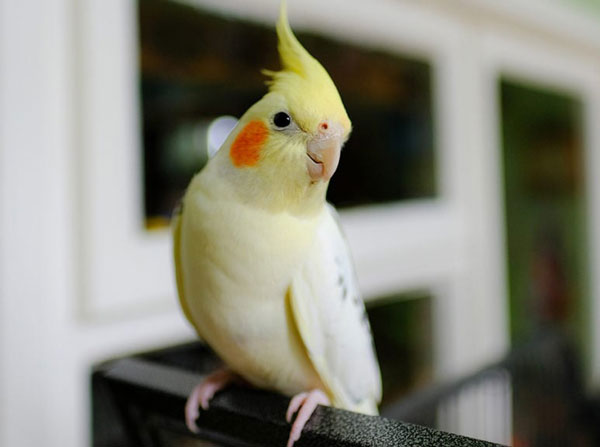
Here are some possible reasons why the cockatiel taps its beak on you.
Express ownership
If you have been spending time with a new pet or person, the cockatiel will grow jealous, and they may tap you with their beaks. Territorial behavior gets more intense as the cockatiel grows. If it is not stopped, the cockatiel will resort to more extreme ways, such as biting and scratching.
Express affection
If you have a strong relationship with your cockatiel, it may tap its beak on you before grooming. That shows that the cockatiel likes and trusts you.
Express annoyance
If your cockatiel taps its beak on you and then flees, it dislikes what you’re doing. Yelling at your cockatiel or petting it the wrong way may make the bird annoyed. Also, wearing the wrong color of clothing can irritate your cockatiel.
How Do I Stop My Cockatiels From Destructive Beak Tapping?
You should only prevent beak tapping if your cockatiel appears to be in pain or discomfort. For example, the cockatiel taps its beak due to stress, boredom, or aggressive territorial behavior. Here is what you should do.
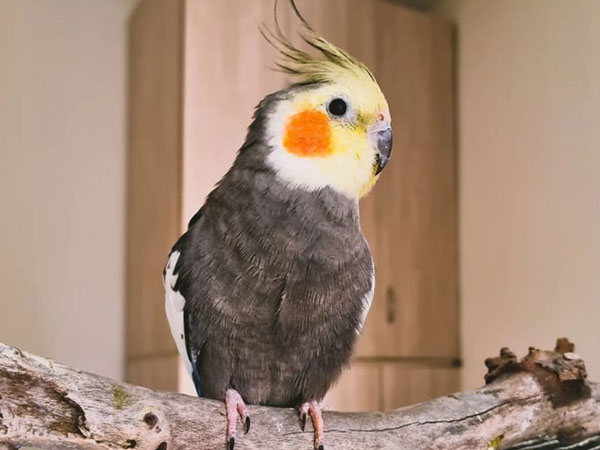
- Introduce your cockatiel to other individuals to prevent it from becoming overly connected to you.
- Spend time with your cockatiel. Social interaction is a significant part of your cockatiel’s life. If possible, you can take the cockatiel outside and play with it. Also, add toys and puzzles in its cage to keep your cockatiel mentally stimulated. You can rotate the toys every week to keep the cockatiel engaged.
- Ensure the cockatiel has access to food and water throughout. Refill the food bowl daily.
- Put the cockatiel’s cage in a room with little or no noise, especially at night. That way, your cockatiel can get the rest it needs at night. For the lights, dim them at night so the cockatiel gets to have 12 hours of darkness, as recommended by avian veterinarians.
- For grooming, you can provide the cockatiel with chewable toys, natural perches, or cuttlebone that it can use to trim the beak. In the wild, cockatiels groom and preen each other, so adding another cockatiel might help too.
- Try and remove any stress or fear triggers near the cockatiels.
FAQs
Here are other related questions about cockatiels tapping their beaks.
Beak banging is more of a strong thump than a light tap. Cockatiels use beak banging during mating season or when they want your attention. Don’t worry; your cockatiel’s beak cannot get damaged from the banging.
Cockatiels will tap their beaks on a window if they notice a threat outside the window or to ascertain dominance over the cage. If the tapping is continuous, the cockatiel is warning you to stay away. Also, it could be that the cockatiel is trying to communicate with its reflection in the window.
Conclusion
So, why do cockatiels tap their beaks? They tap their beaks as a way to communicate with their owners. In addition, beak tapping could signify the need for attention, stress, territorial behavior, and boredom. You should only worry if the beak tapping results in self-destructive behavior.
To stop beak tapping, ensure you take care of your cockatiel regarding food, mental stimulation, and eliminating all stressors.
